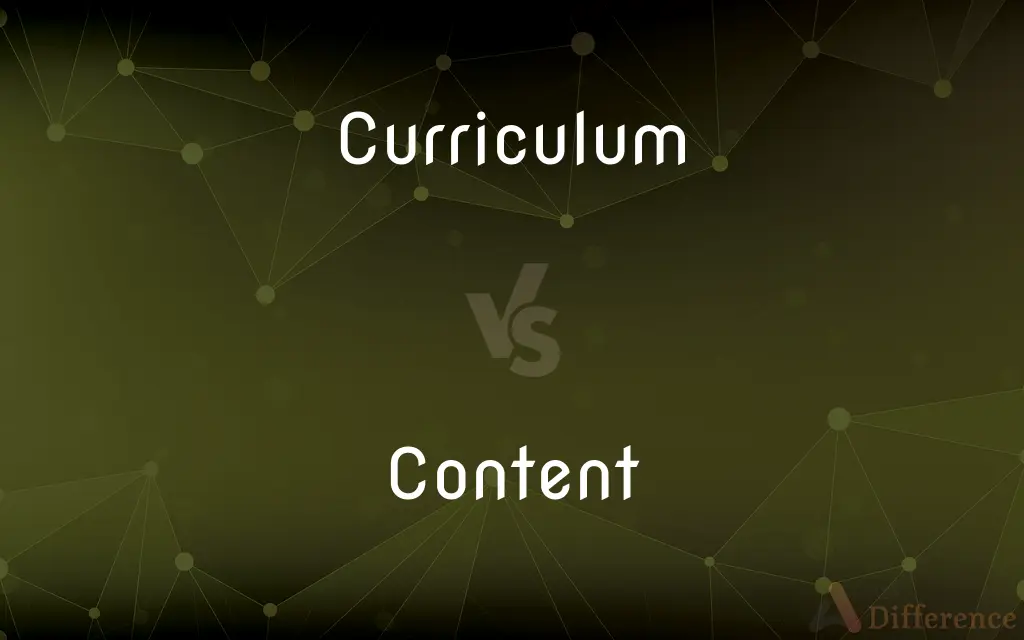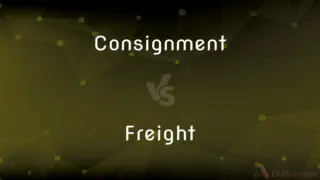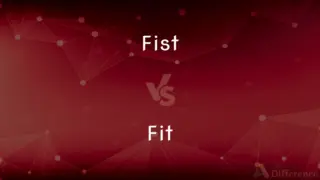Curriculum vs. Content — What's the Difference?
By Tayyaba Rehman & Fiza Rafique — Updated on March 25, 2024
Curriculum refers to the structure and educational goals of a course or program, whereas content encompasses the specific information and materials taught.

Difference Between Curriculum and Content
Table of Contents
ADVERTISEMENT
Key Differences
The curriculum is a comprehensive framework that outlines the educational objectives, course structure, learning outcomes, and assessment methods for a course or educational program. It encompasses the sequence in which teaching will occur and the strategies employed to facilitate learning. On the other hand, content refers to the actual subject matter, topics, and materials used within the curriculum to achieve its objectives. This includes textbooks, lectures, multimedia resources, and any other educational tools.
While the curriculum is concerned with the broader educational journey, including what skills and knowledge students should acquire by the end of the course, content is focused on the specific pieces of information that will be delivered to achieve those aims. For example, the curriculum might specify developing critical thinking skills, whereas the content might include specific case studies or literary works used to foster those skills.
Curriculums are often designed by educational institutions, accrediting bodies, or curriculum developers to align with educational standards and goals. This process involves careful planning to ensure a comprehensive educational experience. Content, however, can be selected and tailored by individual educators to fit the curriculum’s framework, allowing for flexibility and adaptation to students' needs and interests.
The curriculum includes the methodologies for teaching and learning, such as project-based learning or blended learning approaches, and how assessment will be integrated into the program. Content, while a crucial component of the curriculum, does not encompass these pedagogical strategies or assessment methodologies.
While both are essential for the educational process, the success of a curriculum in achieving its intended outcomes heavily relies on the quality, relevance, and delivery of the content. Educators play a critical role in bridging the curriculum's goals with the content delivered to students, ensuring that the educational journey is both meaningful and effective.
ADVERTISEMENT
Comparison Chart
Definition
The framework and goals of an educational program.
The specific information and materials taught.
Scope
Broad, encompasses goals, structure, outcomes.
Specific, focuses on subject matter and materials.
Role
Outlines what should be taught and assessed.
Provides the material needed to meet curriculum goals.
Design
Developed by institutions or bodies for standardization.
Selected by educators to fit the curriculum’s objectives.
Focus
On educational strategies and assessment methods.
On the topics, facts, and materials used in teaching.
Compare with Definitions
Curriculum
A structured set of educational objectives and goals.
The curriculum for the science program includes both theory and practical experiments.
Content
Information made available by a website or other electronic medium.
Educational content online supplements our curriculum.
Curriculum
A course of study in a school or college.
The new curriculum focuses more on interactive learning.
Content
The substance or material dealt with in a speech, literary work, etc.
The content of her lecture was groundbreaking.
Curriculum
The subjects comprising a course of study.
The curriculum covers math, science, history, and English.
Content
Subject matter, topics, information, or experience provided to an audience.
The course content includes both textbooks and online resources.
Curriculum
A document or plan outlining a course of study.
Teachers met to discuss revisions to the curriculum.
Content
The elements of a subject that are included in a course or book.
The content for the semester includes four major novels.
Curriculum
The total learning experiences provided by an educational institution.
Our school’s curriculum is designed to foster both academic and personal growth.
Content
The topics or matters covered in a book, course, or document.
The content of the history course spans several centuries.
Curriculum
In education, a curriculum (; plural curricula or curriculums) is broadly defined as the totality of student experiences that occur in the educational process. The term often refers specifically to a planned sequence of instruction, or to a view of the student's experiences in terms of the educator's or school's instructional goals.
Content
Often contents Something contained, as in a receptacle
The contents of my desk drawer.
The contents of an aerosol can.
Curriculum
All the courses of study offered by an educational institution.
Content
The individual items or topics that are dealt with in a publication or document
A table of contents.
Curriculum
A group of related courses, often in a special field of study
The engineering curriculum.
Content
The material, including text and images, that constitutes a publication or document.
Curriculum
The set of courses, coursework, and their content, offered at a school or university.
Content
The substance or significance of a written work, especially as contrasted with its form.
Curriculum
(obsolete) A racecourse; a place for running.
Content
Information, such as text, video, and sound, usually as contrasted with its format of presentation
A television producer looking for content that was more entertaining.
Curriculum
A race course; a place for running.
Content
The proportion of a specified substance
Eggs have a high protein content.
Curriculum
A course; particularly, a specified fixed course of study, as in a university.
Content
Contentment; satisfaction.
Curriculum
An integrated course of academic studies;
He was admitted to a new program at the university
Content
Desiring no more than what one has; satisfied.
Content
Ready to accept or acquiesce; willing
She was content to step down after four years as chief executive.
Content
To make content or satisfied
Contented himself with one piece of cake.
Content
Satisfied, pleased, contented.
Content
(obsolete) Contained.
Content
Satisfaction, contentment; pleasure.
They were in a state of sleepy content after supper.
Content
(obsolete) Acquiescence without examination.
Content
That which contents or satisfies; that which if attained would make one happy.
Content
An expression of assent to a bill or motion; an affirmative vote.
Content
A member who votes in assent.
Content
(uncountable) That which is contained.
Content
Subject matter; semantic information (or a portion or body thereof); that which is contained in writing, speech, video, etc.
Although eloquently delivered, the content of the speech was objectionable.
Some online video creators upload new content every day.
Prolific creators manage their voluminous content with any of various content management systems.
Content
The amount of material contained; contents.
Light beer has a lower alcohol content than regular beer.
Content
(obsolete) Capacity for containing.
Content
(mathematics) The n-dimensional space contained by an n-dimensional polytope (called volume in the case of a polyhedron and area in the case of a polygon); length, area or volume, generalized to an arbitrary number of dimensions. Category:en:Higher-dimensional geometry
Content
The greatest common divisor of the coefficients; (of a polynomial with coefficients in an integral domain) the common factor of the coefficients which, when removed, leaves the adjusted coefficients with no common factor that is noninvertible.
Content
(archaic) Alright, agreed.
Content
(transitive) To give contentment or satisfaction; to satisfy; to make happy.
You can't have any more - you'll have to content yourself with what you already have.
Content
To satisfy the expectations of; to pay; to requite.
Content
Contained within limits; hence, having the desires limited by that which one has; not disposed to repine or grumble; satisfied; contented; at rest.
Having food and raiment, let us be therewith content.
Content
That which is contained; the thing or things held by a receptacle or included within specified limits; as, the contents of a cask or bale or of a room; the contents of a book.
I shall prove these writings . . . authentic, and the contents true, and worthy of a divine original.
Content
Power of containing; capacity; extent; size.
Strong ship's, of great content.
Content
Area or quantity of space or matter contained within certain limits; as, solid contents; superficial contents.
The geometrical content, figure, and situation of all the lands of a kingdom.
Content
Rest or quietness of the mind in one's present condition; freedom from discontent; satisfaction; contentment; moderate happiness.
Such is the fullness of my heart's content.
Content
Acquiescence without examination.
The sense they humbly take upon content.
Content
That which contents or satisfies; that which if attained would make one happy.
So will I in England work your grace's full content.
Content
An expression of assent to a bill or motion; an affirmative vote; also, a member who votes "Content.".
Supposing the number of "Contents" and "Not contents" strictly equal in number and consequence.
Content
To satisfy the desires of; to make easy in any situation; to appease or quiet; to gratify; to please.
Do not content yourselves with obscure and confused ideas, where clearer are to be attained.
Pilate, willing to content the people, released Barabbas unto them.
Content
To satisfy the expectations of; to pay; to requite.
Come the next Sabbath, and I will content you.
Content
Everything that is included in a collection;
He emptied the contents of his pockets
The two groups were similar in content
Content
What a communication that is about something is about
Content
The proportion of a substance that is contained in a mixture or alloy etc.
Content
The amount that can be contained;
The gas tank has a capacity of 12 gallons
Content
The sum or range of what has been perceived, discovered, or learned
Content
The state of being contented with your situation in life;
He relaxed in sleepy contentedness
They could read to their heart's content
Content
Something (a person or object or scene) selected by an artist or photographer for graphic representation;
A moving picture of a train is more dramatic than a still picture of the same subject
Content
Satisfy in a limited way;
He contented himself with one glass of beer per day
Content
Make content;
I am contented
Content
Satisfied or showing satisfaction with things as they are;
A contented smile
Common Curiosities
Can content vary within the same curriculum?
Yes, content can vary as educators may choose different materials to meet the curriculum's objectives, allowing for flexibility and adaptation.
Who designs the curriculum?
Curriculums are often designed by educational institutions, accrediting bodies, or curriculum developers to align with educational standards and goals.
Can a curriculum change over time?
Yes, curriculums can be updated or revised to reflect new educational standards, technologies, and societal needs.
Can the same content be used across different curriculums?
Yes, the same content can be adapted or used in different curriculums if it supports the educational goals of each.
What is the difference between curriculum and content?
The curriculum is the overall educational framework and objectives, while content is the specific information and materials used to achieve those goals.
How is the success of a curriculum measured?
The success of a curriculum is measured by how well students achieve the outlined educational objectives and learning outcomes.
How important is content in fulfilling the curriculum?
Content is crucial as it provides the necessary information and experiences to meet the curriculum’s educational objectives.
How does technology impact curriculum and content?
Technology offers new ways to deliver content and implement the curriculum, enhancing interactivity, accessibility, and engagement.
Is assessment part of the curriculum or content?
Assessment is part of the curriculum, as it involves evaluating students’ understanding and mastery of the content based on the curriculum’s goals.
What is the role of feedback in curriculum development?
Feedback from educators, students, and stakeholders is crucial for refining and improving the curriculum to better meet educational goals and needs.
Is digital content considered part of the curriculum?
Digital content can be part of the curriculum if it aligns with the educational goals and is used as teaching material.
How does curriculum influence teaching methods?
The curriculum influences teaching methods by outlining the strategies and approaches for delivering content and assessing learning outcomes.
Why is it important for content to align with the curriculum?
It ensures that teaching materials are relevant and contribute effectively to achieving the curriculum’s objectives.
What makes a curriculum effective?
An effective curriculum is well-structured, relevant, adaptable, and aligned with educational standards and students’ needs.
What role do educators play in connecting curriculum and content?
Educators bridge the curriculum's goals with the delivery of content, ensuring the educational process is meaningful and effective.
Share Your Discovery

Previous Comparison
Consignment vs. Freight
Next Comparison
Fist vs. FitAuthor Spotlight
Written by
Tayyaba RehmanTayyaba Rehman is a distinguished writer, currently serving as a primary contributor to askdifference.com. As a researcher in semantics and etymology, Tayyaba's passion for the complexity of languages and their distinctions has found a perfect home on the platform. Tayyaba delves into the intricacies of language, distinguishing between commonly confused words and phrases, thereby providing clarity for readers worldwide.
Co-written by
Fiza RafiqueFiza Rafique is a skilled content writer at AskDifference.com, where she meticulously refines and enhances written pieces. Drawing from her vast editorial expertise, Fiza ensures clarity, accuracy, and precision in every article. Passionate about language, she continually seeks to elevate the quality of content for readers worldwide.















































